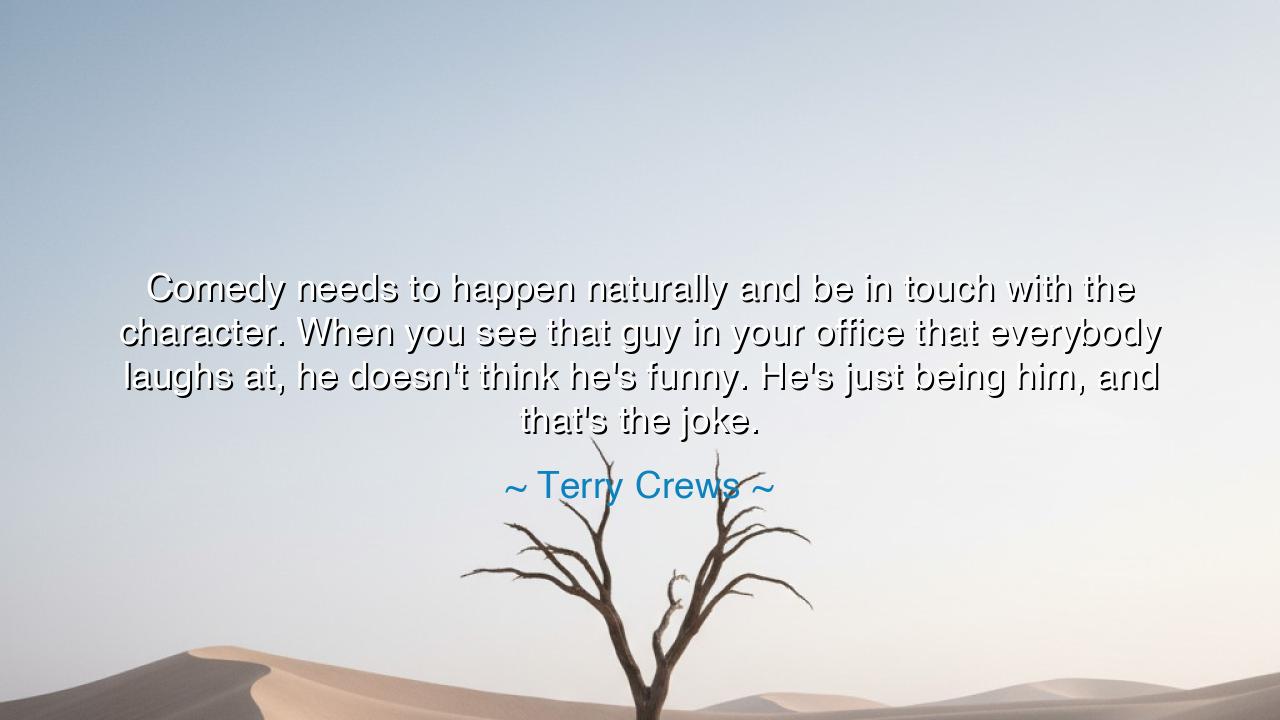
Comedy needs to happen naturally and be in touch with the
Comedy needs to happen naturally and be in touch with the character. When you see that guy in your office that everybody laughs at, he doesn't think he's funny. He's just being him, and that's the joke.






When Terry Crews said, “Comedy needs to happen naturally and be in touch with the character. When you see that guy in your office that everybody laughs at, he doesn’t think he’s funny. He’s just being him, and that’s the joke,” he was not merely talking about laughter — he was speaking of truth, of the power of authenticity, and of the mysterious harmony between being and art. His words are a meditation on the nature of comedy, but beneath them lies a lesson for every human soul: that what moves others most is not the performance we construct, but the honesty we live. True humor, like true wisdom, cannot be forced; it must spring forth as water from a deep, clear well — spontaneous, unbidden, yet nourishing to all who encounter it.
The origin of this insight lies in Crews’ own journey through the twin worlds of strength and vulnerability. Known first as an athlete, later as an actor, and ultimately as a man of profound self-awareness, he has stood in both arenas — the one of muscle and might, and the one of heart and laughter. In his roles, whether in the absurd brilliance of Brooklyn Nine-Nine or the heartfelt awkwardness of Everybody Hates Chris, Crews discovered that comedy is not a mask but a mirror. The truest laughs come not from exaggeration or cleverness, but from the raw, unpolished truth of character — the humanity that each of us recognizes, often painfully, in ourselves.
To say that “comedy needs to happen naturally” is to echo an ancient truth: that art loses its soul when divorced from sincerity. The Greek philosopher Aristotle, in his Poetics, spoke of comedy as the imitation of the imperfect — not to mock humanity, but to reveal its folly and grace. The greatest jesters and poets of history have known this. Shakespeare’s fools were not clowns because they tried to be; they were wise because they simply were. They told truths that kings could not speak, not through pretense, but through the purity of their nature. Likewise, the “guy in your office” who makes everyone laugh does not script his humor; he lives it. His gestures, his misunderstandings, his unfiltered words — all are born of authenticity, and that is what makes them divine.
In this, Crews reminds us of a deeper paradox: that the funniest people are often the most sincere. They do not seek laughter; laughter seeks them. This mirrors the story of Buster Keaton, the silent film genius who never smiled on screen, yet made millions laugh. He did not act “funny” — he acted real. His character’s disasters, his falls, his bewilderment were reflections of the human struggle itself. His solemnity was his genius. For it is in earnestness that comedy finds its strength. The moment we try to be funny, we are no longer honest; and when honesty departs, so too does laughter’s power.
Crews’s observation also carries a moral weight beyond art. To be “in touch with the character” is to live in touch with oneself. In every workplace, home, or friendship, there are those who exhaust themselves trying to please or impress. But the one who is most loved, most remembered, is often the one who is simply genuine — who speaks without guile, who moves without calculation. It is their naturalness that makes others smile, because it gives permission for everyone else to be real. In this way, humor becomes a form of healing. When we laugh at the “guy in the office,” we are not mocking him — we are recognizing the beauty of imperfection in ourselves.
Yet there is a warning hidden within Crews’s words. He says, “He doesn’t think he’s funny.” This humility, this lack of awareness, is the heart of his power. The moment one becomes self-conscious, the magic fades. The ancients knew this as the curse of Narcissus — the man who, upon seeing his own reflection, could no longer live freely, for he was consumed by his image. So too, in life and in art, those who seek to appear charming, clever, or admirable lose the natural grace that made them so. To be authentic, one must forget oneself — and in that forgetting, the soul shines brightest.
So, my children, take this lesson deeply into your hearts: be natural, not performative. Let your laughter, your kindness, and your creativity flow from truth, not from the need to be seen. In art, in work, in life, the most powerful moments arise not from effort, but from presence — when you cease to “try” and begin simply to be. If humor comes, let it come through your honesty. If inspiration comes, let it flow through your character. For life’s greatest beauty, like comedy itself, is not rehearsed — it is lived.
Thus, as Terry Crews teaches, the sacred essence of comedy — and of life — is authenticity. The world laughs not at perfection, but at recognition; not at artifice, but at truth. Live so fully in your truth that even your missteps become music, your awkwardness becomes art, your sincerity becomes joy. And when others laugh, let them — for their laughter will not be mockery, but celebration: the sound of humanity recognizing itself in you.






AAdministratorAdministrator
Welcome, honored guests. Please leave a comment, we will respond soon